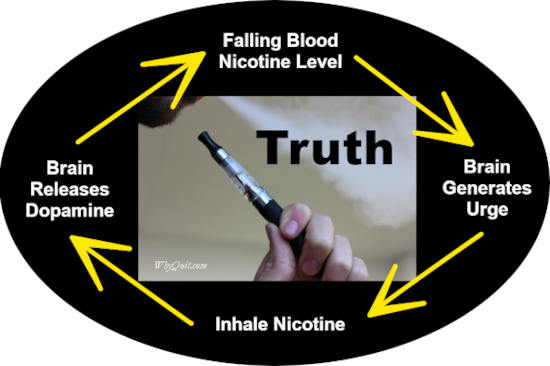
Dependency rationalizations seek to deny or minimize being hooked or suggest alternative reasons for continuing use. Let's look at a few examples.
We reviewed the following dependency rationalizations in Chapter 4:
- "It's my choice and I choose to use."
- "It's just a nasty little habit."
- "I'm just a little bit addicted."
Can you see the common thread? "I'm not a real drug addict." "I use for reasons other than need."
Here are 7 additional dependency rationalizations. As you review them, reflect on the justifications you used to explain why you kept using?
- "I don't even know if I'm hooked. I've never tried stopping."
Some have never made a serious recovery attempt. But why? What better way of never having to admit chemical dependence or experience defeat than by avoiding evidence that a problem exists?
- "I only use once daily!"
Some rationalize that their use level is too little to be addicted or they fib about how much or often they use. Either way, the objective is the same, to deny that a problem exists, to be different or better than other users.
The level of tolerance varies greatly among dependent users. Like many of us when we first started using, some are able to go 3 to 4 days without. The need for such minimization is itself evidence of denial. Being a little bit addicted is like being a little bit dead.
- "I don't use!"
Even worse are the closet smokers like my grandma Polito who constantly tried to convince us that the thick cloud of smoke rolling out of the bathroom behind her simply wasn't there. How much more visible could denial be?
- "I only smoke because it gives me something to do with my hands."
Whittling wood, knitting and juggling are also things to do with our hands and they don't come with a 50 percent chance of our life ending 13-14 years early.
Such weak dependency denial rationalizations ignore that doodling with a pen, playing with coins, squeezing a ball, or using strength grippers may be habit-forming but are non-addictive. While we might get ink on ourselves, become rich, or develop massive forearms, our chance of serious injury, disease, or death is likely near zero.
- "It's my right to blow smoke!"
Truth is, we were chemically obligated to blow smoke. And as far as smoker rights or vaping rights, they continue to evaporate. Social controls to protect the rights of non-smokers continue sweeping the globe.
If inhaling nicotine truly is as addictive as heroin, should we be surprised as society continues its march toward banning use within view of children? It's already happening in parks, on beaches, on hospital grounds, and on entire college campuses. It's also increasingly an issue in determining child custody and visitation rights and obligations in divorce actions.
And where permitted by law, employers are beginning to refuse to hire those testing positive for nicotine or cotinine.
- "These new flavors are fantastic!"
Pina colada, pumpkin pie, watermelon, pralines n' cream, marshmallow, raspberry cheesecake, peach schnapps, maple, sugar cookie, key lime, chocolate mint, bubble gum, pineapple, flavored e-liquid nicotine is today available in every flavor imaginable.
The neo-nicotine industry is providing those hooked on replacement nicotine or e-cigarettes plenty of reasons to explain continued use.
But how many chew expensive cinnamon or fruit-flavored nicotine gum 5, 10, or 15 times daily because of great tasting fruit, mint, or cinnamon? How many really chew or vape cappuccino flavored nicotine because of a deep love for the taste of coffee?
And where does the e-cig user turn when their last atomizer breaks? A straw maybe? Slow deep breaths? I don't think so.
- "I'll cut down or smoke just one now and then."
Such rationalizations pretend that chemical dependency is some nasty little habit capable of manipulation, modification, and control. We are drug addicts. Although accompanied by alertness, the dopamine pathway wanting we feel for nicotine is no different from the wanting felt by the crack, heroin, or meth addict.
While possible to gradually diminish your level of tolerance over time, attempts to do so may leave you in a perpetual state of low-grade withdrawal. While users may adjust to using less often, they can compensate by puffing, chewing, or sucking harder, or if addicted to inhaled nicotine, by sucking deeper and holding it longer.
Dependency's bottom line? How can one get to where they want to be without knowing where they stand? Once there, imagine not knowing or accepting the sole rule determining how long you get to stay.
My primary protection against relapse, it's why, 21 years later, I have zero hesitation in reminding myself who I am.
My name is John and I'm a recovered nicotine addict who remains just one puff away from throwing away my greatest personal accomplishment ever.
All rights reserved
Published in the USA
